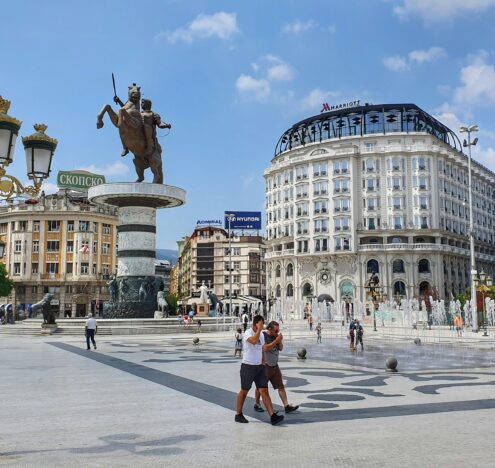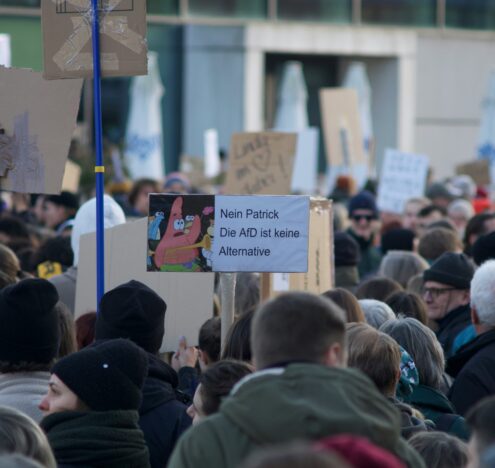“The Changing of a Continent” is a column by journalist Kenneth R. Rosen that focuses on the US trans-Atlantic relationship and Europe’s future.
“There is a gap emerging between Europe’s east and west, old Europe and new Europe, and that’s beneficial only for Vladimir Putin,” the Berlin director of the European Council on Foreign Relations told The New York Times in December 2022. The gap was first displayed when Germany offered to host NATO Patriot anti-missile systems on Polish soil. The offer came after two Poles were killed in an errant missile strike from one of Ukraine’s own missile-defense systems, which borders Poland. The offer was accepted, then rejected, with some within the Polish government citing a deterioration of trust in Germany’s stance against Russia’s unprovoked invasion of Ukraine.
Warsaw views Germany’s reliance on Russia as a cheap provider of natural gas through the Nord Stream 2 pipeline, which bypassed both Ukraine and Poland, as evidence that Berlin plans to restart relations with Moscow after the conflict. In other words, in Poland’s view, Germany has simply stalled its relationship with Russia instead of severing ties completely. Ultimately, a German NATO presence in Poland was the better of two options, the second of which was Warsaw’s proposal to send those missiles to Ukraine. But crossing any line that might further inflame the Russian-Ukraine conflict and welcome NATO or its members into direct embattlement with Russia is something the European Union and the coalition have avoided.
The disunion between Warsaw and Berlin only serves to widen a growing chasm between the two nations as the European bloc struggles to maintain its cohesion as the war in Ukraine nears the start of its second year.
Tit-for-Tat Exchanges
On Jan. 7, 2023, less than a month after the collapse of the missile deal, Poland’s nationalist government renewed efforts to pursue Germany for further reparations stemming from Germany’s occupation of Poland during World War II. The exchange began in October 2022, stalled over the missile discussion phases, and renewed this year.
The disunion between Warsaw and Berlin only serves to widen a growing chasm between the two nations as the European bloc struggles to maintain its cohesion as the war in Ukraine continues.
“According to the German government, the matter of reparations and compensation for war losses remains closed, and the German government does not intend to enter into negotiations on this matter,” Poland’s foreign ministry said in a statement. “The government of the Republic of Poland will continue its efforts to settle debts resulting from German aggression and occupation in the years 1939-1945.”
The fracturing stance, taken by Poland’s ruling nationalist Law and Justice (PiS), and which the party has used to rally its base in recent years, further harmed diplomatic ties between the two countries. The PiS’ stance has hindered diplomatic relations with Germany by undermining Berlin’s narrative of resolving and accounting for its Nazi history.
Berlin argued it fully compensated the East Bloc nations after the war and returned territories Poland lost. Viewing the Berlin-Warsaw kerfuffle in the grander context of EU COVID-19 recovery funds, Warsaw’s approach seems to be one avenue to ensure its share of disbursements after Hungary received a financial aid package of 5.8 billion euros ($6.11 billion) that includes funds for Ukraine military spending and pandemic spending.
Broader European Fallout
Faced with financial and political pressures at home, Poland is doubling its efforts to maintain its rule-of-law reforms, which the European Court of Justice ruled incompatible with European Union law in the summer of 2021. A fine of 1 million euros per day has plunged Poland into a 300 million debt against the EU’s highest court, which rises daily. Moreover, it has hindered Warsaw’s access to its share of the NextGenerationEU COVID-19 recovery funds — some 36 billion euros.
In July 2022, the PiS party leader Jaroslaw Kaczynski and his aides vowed an “end of concessions,” marking Brussels and Berlin as two antagonists more dangerous than Russia. But in recent weeks, the notion of rising debt and a loss of recovery funds has spurred proposals to reform the Polish judicial system, one which, according to critics and analysts, is overly politicized.
As I’ve written before, the time for renewed cooperation among European bloc members has passed. Instead, what is needed in the New Year is a concerted push to reduce financial strain among the union’s poorest members by bolstering assistance to those harboring Ukrainian refugees. The EU also needs to reform its election rules and grant constituents a greater role in choosing the commission president and members of the European Parliament.
Kenneth R. Rosen is a columnist at Inkstick and a contributing editor at Coda, where he writes the weekly Fallout newsletter.





















